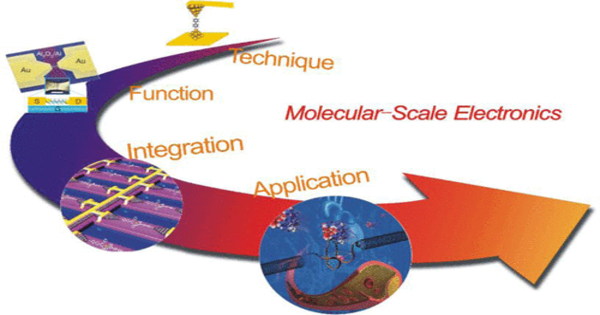Molecular scale electronics, sometimes known as single-molecule electronics, is a field of nanotechnology that employs single molecules as electronic components, or nanoscale collections of single molecules. It is an area of science and technology that investigates the use of individual molecules or nanoscale materials as building blocks for electrical systems. It is also known as molecular electronics or nanoelectronics. Miniaturization is the ultimate goal for downsizing electrical circuits since single molecules form the smallest stable structures feasible. Beyond standard semiconductor-based technology, it suggests a potential future direction for electronics.
The term “molecular electronics” is frequently used to refer to the distantly related fields of conductive polymers and organic electronics, which employ the properties of molecules to impact the bulk properties of a material. A terminology distinction has been proposed, with molecular materials for electronics referring to the later field of bulk applications and molecular scale electronics referring to the nanoscale single-molecule applications discussed here.
Here are some key concepts and aspects of molecular scale electronics:
- Nanoscale Components: Electronic components in molecular scale electronics are developed and built at the nanoscale, frequently employing individual molecules as building blocks. Transistors, cables, switches, and diodes are examples of these components.
- Molecular Wires: The molecular wire, which is made up of a chain of molecules that can carry electrical current, is a crucial element in molecular electronics. These wires can be constructed from a variety of biological and inorganic materials.
- Single-Molecule Devices: Researchers want to make electronic gadgets off of a single molecule. These single-molecule devices have the potential to function as transistors, memory elements, or even sensors. They are extremely tiny, which could lead to the development of ultra-compact and energy-efficient devices.
- Quantum Effects: At the molecular scale, quantum mechanical effects become significant. Researchers in molecular electronics study how these effects can be harnessed for novel electronic functionalities. Quantum tunneling, for example, can be exploited to create switches with extremely low power consumption.
- Self-Assembly: Molecular electronics often involves the self-assembly of nanoscale components. Molecular structures can be designed to spontaneously arrange themselves into functional electronic circuits, reducing the need for complex manufacturing processes.
Applications
Molecular scale electronics has promise for a variety of applications, including ultra-dense memory storage, high-performance computation, and ultra-sensitive sensing. It may potentially find use in flexible and transparent electronics.
Challenges
Despite its promise, molecular electronics confronts various obstacles. The precise control and repeatability of molecule structures and their electrical characteristics is a serious challenge. Ensuring the stable and reliable operation of devices at the molecular scale is another significant challenge.
Current Research
Researchers are actively investigating numerous molecular materials for application in molecular electronics, including as organic molecules, carbon nanotubes, and even individual atoms. They are working on novel production processes as well as investigating the possibilities of quantum dots and other quantum phenomena.
In summary, molecular scale electronics is an emerging discipline that investigates the utilization of individual molecules and nanoscale materials to produce electronic devices with distinct features. While it has immense potential for the future of electronics, it also poses significant scientific and engineering hurdles that must be overcome before practical applications can be realized.
















